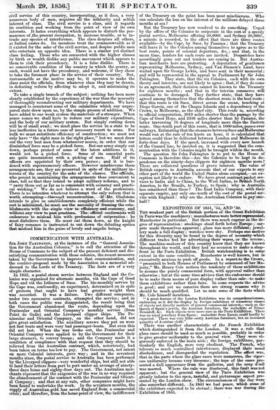COMMUNICATION WITH AUSTRALIA.
Bin jonw RAKINGTON, at the instance of the " General Associa- tion for the Australian Colonies," is to call the attention of the House -of Commons to the subjek of the present deficient and dis- satisfying communication with those colonies, the recent measures taken by the Government to improve that communication, and. the eounter-proposal made birtehltifisociation in a memorial ad-
dressed to the Lords of the . The facts are of a very simple character. In 1852, a postal steam service between England and the Co- lonies was organized for alternate months, via the Cape of Good Hope and via, the Isthmus of Suez. The bis-monthly service by the Cape was, confessedly, an experiment, determined on in att.: of protests that ought to have had greater weight
was accorded. It was a failure. Two different companies, under two successive contracts, attempted the service ; and in both cases the public was disappointed, the result being that the Government abandoned the route, depending upon the Peninsular and Oriental Company's monthly service (from Point de Galle) and the Liverpool clipper ships. The Pe- ninsular and Oriental Company, on the other hand, did not give great satisfaction. The auxiliary screws they put on were not fast boats and were very bad passenger-boats. But even this did not last. When the war broke out, the Peninsular and Oriental Company were applied to by the Government for their large steamers, to convey troops ; and the Company made it a condition of compliance with that request that they :should be relieved from the Australian contract, which, notoriously, had been taken on terms too low to pay. .The Government., not intent on mere Colonial interests, gave, way ; and in the seventeen months since, the postal service to Australia has been performed by the Liverpool clippers—very wonderful ships, but still not able to land their letters from port to port under:an average of ninety- three days home and eighty-four days out. The Australian mer- chants represent that the exigencies of the war in no way required the abandonment of the contract with the Peninsular and Orient- al Company ; and that at any rate, other companies might have been found to undertake the work. In the seventeen months, the supply of Australian gold. has saved England from a commercial. ensis ; and- therefore, from the home point of view, the indifference'
of the Treasury on the point has been most mischievous. Who can calculate the loss on the interest of the millions delayed three. months at sea ?
But the Treasury has now resolved to do something. Urged by the offers of the Colonies to cooperate in the cost of a speedy postal service, Melbourne offering 50,0001. and Sydney 20,000/., a minute is recorded, to the effect that there are three routes available—by the Cape, by Suez, by Panama ; that the Treasury will leave it to the Colonies among themselves to agree as to the best route, points of colonial departure, &c. ; and that, in the mean time, tenders for each route are invited. Despatches have accordingly gone out and tenders are coming in. But Austra- lian merchants here are protesting. A deputation of 'gentlemen representing Melbourne, Sydney, and Van Diemen's Land, have waited upon Sir George Lewis, and have sent in their memorial ; and will be re resented in the appeal to Parlia.menthy Sir John Pakington. They state, that the six Colonies, each with its own theory and interests, are not likely to agree ; that, if they do come to an agreement, their decision cannot be known to the Treasury for eighteen months ; and that in the interim commerce will continue to be deranged. They further state, that. they have agreed among themselves that the shortest route is the best route ; that this route is via Suez, direct across the ocean, touching at Diego Garcia, one of the Chagos Islands and a. dependency of the Crown, to Melbourne, as the chief city. This route is, according to official computation, 3019 miles shorter than the passage by the Cape of Good Hope, and 2338 miles shorter than by Panama, the latter traversing 76 degrees of longitude more than: the Eastern route. One-tenth part of this route, that is 10011miles,passes over railways. Estimating that the steamers between Suez and Melbourne would run at the rate of ten knots an hour, it is calculated that letters could thus be delivered between London and Melbourne in forty-four days. If the speed, increased with every new launch of the Cunard line, be insisted on, it is suggested that the com- munication with the Colonies might be brought within the month. The question Sir John Pakington is to put to the House of Commons is therefore this—Are the Colonies to be kept in de- pendenee on the ninety-days Clippers for eighteen months more? There are collateral questions of grave interest. The value of British exports to Australia excees that' of our exports to any other part of the world the United States alone excepted, —an ex- ception not likely to endure. We have great contract packet ser- vices to India and to China, to the West Indies, to British North. America, to the Brazils, to Turkey, to Spain : why is Australia less considered than these ? The East Company, with their separate empire, pay only one-tenth of the coat of the postal ser- vice with England : whyaratlae_Atistralia. n Colonies to, pay one- half ?


























 Previous page
Previous page